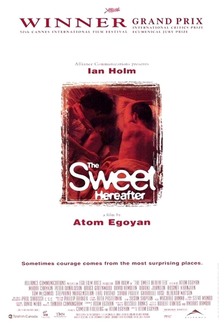
This one made it onto my list as it is a highly regarded film, being apparently considered one of the best Canadian films ever made. It was inspired by a real life accident involving a school bus and a truck but I think it’s been fictionalized enough that it doesn’t matter. I found that I didn’t like it much however due to how its focus seems sort of spread out and how it doesn’t follow through on its individual storylines.
A city lawyer Michell Stephens in a small town in British Columbia in the wake of a terrible tragedy. An accident involving a school bus has killed many of the town’s children, affecting just about every family. Stephens hopes to represent some of these aggrieved parents in a lawsuit, arguing that someone should be blamed. He manages to persuade the couple who owns the local motel to sign on as well as a hippie couple who has lost their son. The local mechanic however resists, seeing Stephens as a predatory lawyer who will only cause divisions in the community. One of the few children who survived is Nicole whose legs have been left paralyzed and whose testimony turns out to be critical. Meanwhile Stephens is also struggling with his own personal problems in the form of his wayward daughter who is a drug addict and continues to call his every so often to ask for money.
I originally thought that this was about how a lawsuit exposes the secrets of a small town and tears it apart. While there are indeed secrets in this small town, the film is a little short on the exposing part and the only source of division is Stephens himself. It’s clear that Stephens behaves less than ethically as he travels to the town on his own initiative after hearing about the accident and doesn’t even know who to blame, only insisting that someone must be responsible and that the lawsuit must be directed against someone rich enough to make it worthwhile. This would make Stephens the villain of the piece, except that the film also humanizes him by spending considerable time on his problems with his daughter and creating some doubt over whether he truly is motivated in part by shared grief over parents losing their children. In addition, there are other stories like that of the bus driver and her husband and how she sees the children of the town, the hippie couple and so on, which are all interesting enough but don’t seem relevant. The focus is so diffuse that it’s confusing, especially as not enough happens with the character of Nicole who is in the center of it all. Perhaps this complexity is better handled in the novel that the film is based on but it’s hard to like in a film like this.
The film is also notable for a couple of aspects of its presentation. One is its extensive use of pseudo-medieval music that grabs your attention but feels more and more out of place given the setting as te film goes on. I suppose it’s meant to complement the story The Pied Piper of Hamelin which is used as a motif throughout the film. Again, it’s a cute affectation but I don’t really see how it applies to the themes here. Just who is supposed to be the Pied Piper of the story? Dolores for driving the bus? Stephens for leading the parents into a selfish, stupid lawsuit for the sake of money? Nicole herself for telling lies? I just don’t get it.
It’s obvious that there are many critics who think highly of The Sweet Hereafter but personally I don’t see why. There are a lot of interesting things going on in it, the grief of an entire town, predatory lawyers preying on rural townsfolk, incest and extra-marital affairs in a small place where everyone knows everyone else, but the film seems to want to go for all them rather than choose one particular direction. That just doesn’t work for me.